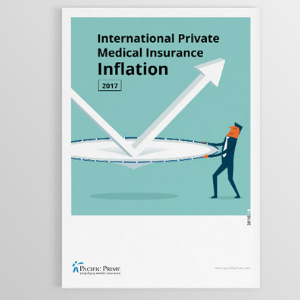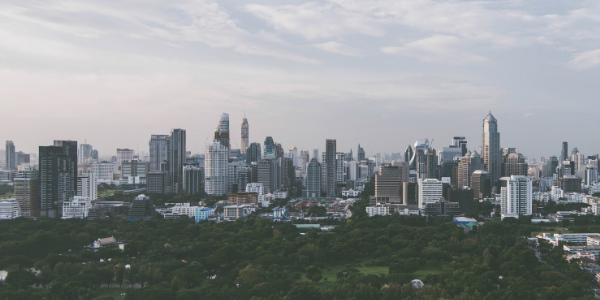Thailand featured in International Private Medical Insurance inflation report
Historically speaking, it’s inevitable that the health insurance premiums you paid the previous year will go up once you renew your plan the following year. Just how much they increase will depend on a number of different factors including the insurer, the country, the plan, etc. To help uncover the factors shaping international private medical insurance prices, Pacific Prime created the International Private Medical Insurance Inflation – 2017 report. Available to download for free here, the report uncovers the key global and local factors driving insurance premium inflation in 10 of the world’s top expat destinations, including Thailand.
Private medical insurance inflation in Thailand
The IPMI inflation report identified that, as indicated in the graph below, health insurance premiums in Thailand increased by an average of 7.8% in 2016. This figure is the exact same as the medical insurance inflation rate of the Philippines, thus continuing the assumption that the insurers included in the study have grouped these countries together and applied the same premium increase to the group. Pacific Prime believes it is likely that Thailand will experience similar increases in 2017.
Country specific drivers of medical insurance inflation
Aside from the major global factors driving IPMI inflation worldwide (i.e. new medical technology, an imbalance of healthcare resources, increased compensation for healthcare, and healthcare overutilization), below are the three key country-specific factors that have been considered in the report to have had an impact on medical insurance premiums in Thailand:
Grouping with other “low cost” Asian markets
When compared with the IPMI inflation rate in 2015, that of 8.8%, Thailand’s IPMI inflation rate actually fell by 1% in 2016. This IPMI inflation shrink seen in Thailand has been the exact same as the figure for Philippines, and is very near to Indonesia’s IPMI inflation rate of 7.6%.
With the 2016 IPMI inflation rates in Hong Kong, China, and Singapore noticeably hiking the opposite direction by +3.5%, +2.6%, and +1.7% respectively, the inflation figures experienced by the rest of Southeast Asia continue to indicate that countries like Thailand, the Philippines, and Indonesia have likely been categorized by insurers as a “low cost” region, and have had premium increases applied as a group.
Cost complaints and government regulations
Although medical treatment in the region is relatively more affordable than healthcare costs seen in other Asian countries, e.g. Hong Kong and Singapore, the Thai government has received a growing number of public complaints criticizing the rapidly rising medical charges in private hospitals, which are making it more and more difficult for middle-income Thais to continue seeking care in high-end hospitals.
The Thai government has also considered implementing a Drugs Bill that would require pharmaceutical companies to reveal their pricing structures as part of their approval and registration process for medicines in Thailand. These public and government attitudes may be a factor shaping the insurers’ decision making around premium prices.
ASEAN AEC developments
The economic developments of the Association of Southeast Asian Nations will pose further challenges to Thailand as cheaper production, outsourcing, and labor rates are seen in its neighboring countries (e.g. Cambodia, Laos, and Vietnam). Amidst a weakening economy, the Thai government may find it hard to deliver on all infrastructure projects, including the healthcare sector. As a result, this could mean higher demand for healthcare with lower supply, which would lead to the inevitable increase in medical costs.
IPMI inflation in Thailand by insurer
The findings uncovered in Pacific Prime’s 2017 IPMI inflation report were based on the individual health insurance plans sold by the following insurers:
- Aetna International – International Healthcare Plan
- Aetna International – Ultracare Plan (InterGlobal)
- Allianz Worldwide Care – International Healthcare Plans
- AXA PPP Healthcare – International Health Plan
- Bupa Global – Global Health Plan
- Cigna Global – Global Health Options
- William Russell – Elite Plan
- IntegraGlobal – Personal Health and Premier Plans

As shown above, the insurance providers with the lowest average IPMI inflation in 2016 were:
- Allianz Worldwide Care, with an inflation rate of 1.59%
- William Russell, with an inflation rate of 5.73%
- AXA PPP Healthcare, with an inflation rate of 6.82%
Although IntegraGlobal had the highest medical insurance inflation rate in 2016 (12.76%), please note that this does not mean they charge the highest premiums in Thailand. Instead, this reflects that they have adjusted their premium prices to market rates to ensure that they are on par with the premiums charged by other insurance providers in the country.
In the meantime, if you’re looking to learn more about health insurance in Thailand, be sure to contact the helpful advisors at Pacific Prime today.
- Why children should have health insurance cover in Thailand - March 18, 2021
- Vaccinations for Thailand: An up-to-date list of all essential inoculations - January 27, 2021
- Important questions to ask about teacher’s health insurance in Thailand - January 26, 2021





Comments
Comments for this post are closed.
We'll notify you
when our team replies!